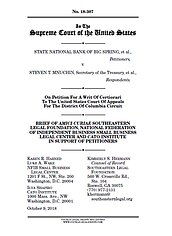In passing the Dodd-Frank Wall Street Reform and Consumer Protection Act, however, Congress circumvented constitutional design and violated the separation of powers doctrine. Among its multifarious failings, Dodd-Frank created the Consumer Financial Protection Bureau (CFPB), controlled by a single director who has the unilateral power to enact, enforce, and adjudicate regulations. The director is not accountable to any internal structure, is exempt from congressional oversight, and cannot be removed by the president for policy reasons. Since its inception, the CFPB has issued 19 federal consumer protection rules, affecting everything from student loans to banking practices, all without checks, balances, or accountability to voters. Essentially, Congress assigned a vast amount of authority to a bureau that answers to no one.
When a challenge to Congress’s unconstitutional delegation went before the U.S. Court of Appeals for the D.C. Circuit, the court refused to consider the impact that the CFPB’s actions have on individual liberty. However, the Supreme Court, in Commodity Futures Trading Commission v. Schor (1986), reminded us that the separation of powers protects “primarily personal, rather than structural, interests.” In other words, substantive freedom, rather than simply procedural rights, is most at risk when checks and balances fail. And so the CFPB, going far beyond simply contravening checks and balances, regulates areas such as home finance and credit cards. These sectors are essential to individual economic activity, so the D.C. Circuit was wrong to hold that the CFPB’s infringements upon these liberties were irrelevant.
The State National Bank of Big Spring, based in west Texas, filed a petition asking the Supreme Court to review the D.C. Circuit’s erroneous decision. Cato has joined the Southeastern Legal Foundation and National Federation of Independent Business on a brief supporting this petition. We argue that the separation of powers, as our Founding Fathers correctly recognized, is a bulwark of our individual liberties. If we allow Congress to delegate authority in a blatantly unconstitutional fashion, our republican system of government will be eroded by powerful bureaucracies with unchecked authority.
